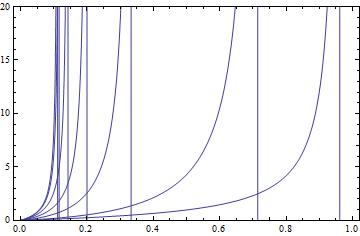I want to plot the following 7 curves without their asymptotes:
\[Gamma] = {-0.99, -0.9, -0.5, 0, 0.5, 0.9, 0.99}
f[\[Lambda]_, \[Gamma]_] := (1 - 5 \[Lambda] + 4 \[Gamma]*\[Lambda]) (
77 \[Lambda]^2 -
76 \[Gamma] \[Lambda]^2 + (10 \[Lambda] -
8 \[Gamma] \[Lambda]) (1 - 5 \[Lambda] +
4 \[Gamma] \[Lambda]))/(
2 - (10 \[Lambda] - 8 \[Gamma] \[Lambda]) (2 - 5 \[Lambda] +
4 \[Gamma] \[Lambda]))
Plot[f[\[Lambda], \[Gamma]], {\[Lambda], 0, 1}, PlotRange -> {0, 20},
Frame -> True]
